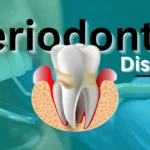Everything About Periodontal Disease: Symptoms, Treatment & Prevention

How to Choose Toothbrush : A Comprehensive Guide
Periodontal disease, commonly known as gum disease, is a serious condition that affects millions worldwide. It begins as an inflammation of the gums and, if left untreated, can result in tooth loss and even impact overall health. While early stages may go unnoticed, recognizing the signs early can make a significant difference in treatment outcomes.

What Is Periodontal Disease?
Periodontal disease is an infection of the tissues that support your teeth. It starts as gingivitis, the mildest form, and can progress to periodontitis, a severe infection that damages the bones supporting your teeth. If untreated, periodontitis can lead to tooth mobility and eventual loss.
How Common Is Periodontal Disease?
Studies show that nearly half of adults in the Pakistan are affected by some form of gum disease, with the numbers increasing with age. Early intervention can halt the progression, but too many people neglect their oral health until symptoms become severe.
Online Appointment
Book an Online Appointment for Gum Disease Treatment Today
Get expert treatment for gum disease. Book your online appointment today at Haya’s Dental Care and take the first step towards a healthier smile.
Symptoms to Watch Out For
Gum disease often starts subtly, with symptoms like swollen gums, bleeding while brushing, and persistent bad breath. As the condition worsens, you may notice receding gums, tooth sensitivity, and even loose teeth. Recognizing these early signs is crucial to preventing irreversible damage.
The Stages of Gum Disease
Gingivitis, the first stage, involves inflammation and bleeding but doesn’t yet damage the bone. If left untreated, it can develop into periodontitis, characterized by deeper infections, gum recession, and potential tooth loss. Early intervention can prevent the progression to periodontitis, preserving your oral health.
What Causes Gum Disease?
At its core, gum disease is caused by plaque—a sticky film of bacteria that forms on your teeth. Poor oral hygiene habits, smoking, certain medications, and even genetic predisposition can exacerbate the condition, leading to inflammation and infection. Understanding the cause of your gum disease is vital in choosing the right treatment approach.
Risk Factors and Complications
While anyone can develop gum disease, certain factors increase the risk. Smoking is one of the biggest culprits, as smokers are twice as likely to develop periodontal disease. Poor diet, genetics, and chronic conditions such as diabetes also play a significant role in the development and progression of the disease. Beyond tooth loss, untreated gum disease has been linked to other serious health issues, including heart disease, diabetes complications, and even premature birth in pregnant women.
Can Periodontal Disease Be Prevented?
The good news is, periodontal disease is largely preventable. Regular brushing and flossing, along with routine dental checkups, can help remove plaque and prevent it from turning into tartar, which can only be removed by a dentist. Healthy habits like eating a balanced diet and quitting smoking also reduce the risk of developing gum disease.
Treatment Options for Periodontal Disease
Once diagnosed, treatment will depend on the severity of the disease. Early stages like gingivitis can typically be reversed with professional cleanings and improved oral hygiene. For more advanced stages of periodontal disease, treatments may include scaling and root planing (deep cleaning), antibiotic therapy, and in some cases, surgical intervention. Timely treatment can prevent further complications and even help save teeth that may otherwise have been lost.
Why Early Diagnosis Matters
The key to managing periodontal disease is early diagnosis. Regular dental exams are critical in detecting gum disease before it progresses to advanced stages. If you notice symptoms like bleeding gums or persistent bad breath, don’t wait—schedule an appointment with your periodontist.
What You Can Do to Lower Your Risk
Prevention is always better than cure. Here are some effective steps to reduce your risk of gum disease:
Brush and floss regularly: At least twice a day, using fluoride toothpaste.
Quit smoking: Smoking significantly increases your risk of gum disease.
Eat a nutritious diet: Focus on foods that promote strong gums and overall health.
Manage existing health conditions: Conditions like diabetes and heart disease can worsen gum disease, so managing them properly is essential.
When Should You See a Dentist?
If you notice any signs of gum disease, such as bleeding gums or persistent bad breath, it’s crucial to seek professional dental care promptly. Early intervention can often reverse the condition, but neglecting treatment can result in long-term complications, including tooth loss.
Frequently Asked Questions About Gum Disease
What Does Gum Disease Look Like?
Gum disease often starts with red, swollen, or bleeding gums. As the disease progresses, you may notice gums receding from the teeth or teeth becoming loose.
How Long Can You Keep Your Teeth with Periodontal Disease?
With the right treatment and care, many people can maintain their teeth even with periodontal disease. The earlier the intervention, the better the chances of saving your teeth.
Is Periodontal Disease Contagious?
While gum disease itself isn’t contagious, the bacteria that contribute to it can be spread through saliva. Good oral hygiene is essential to prevent spreading harmful bacteria to others.
Why Choose Haya's Dental Care for Periodontal Treatment?
At Haya’s Dental Care, we specialize in treating periodontal disease with advanced, personalized care. Our experienced team of periodontists uses the latest techniques and technology to offer effective solutions that preserve your smile and overall health. We understand the impact gum disease can have on your life, and we are here to provide compassionate care every step of the way.
Services
Open Hours
-
Monday - Saturday :
11.00 am - 02.00 pm
03.00 pm - 09.30 pm -
Friday :
03.00 pm - 09.30 pm -
Sunday :
Closed
Get In Touch
Location
Basement D, Awami Plaza, Adiyala Rd, Nat'l Housing Scheme Sector 2, Rawalpindi, 46000, Pakistan
Phone
0303-5452839
haya.dental.care@gmail.com

